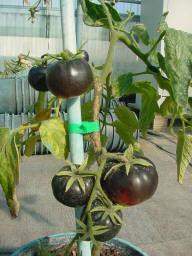A leading oncologist and former minister has provoked anger in Italy after praising the cancer-fighting potential of some genetically modified organisms (GMOs).
Addressing an oncology conference in London, Umberto Veronesi cited a genetically engineered purple tomato unveiled last week by British researchers that has been shown to extend the lives of mice susceptible to cancer.
''There is a great deal of resistance to this fantastic projection into the future and I've never understood why,'' said Veronesi.
''GMOs cause no problems; they are exactly the same as other organisms only better, because conscious efforts have been made to improve their qualities.
''It's difficult to predict what will happen but I hope there will be a growing awareness of the benefits such developments offer''.
But Veronesi's comments were greeted with concern in Italy, where there has traditionally been widespread hostility to GMOs.
Consumer group Codacons implied the former minister had painted a biased picture of the research
''Veronesi should also be telling us about the side effects of this GM tomato and what cancerous cells it can increase,'' said Codacons President Carlo Rienzi.
''Only after ensuring there is absolutely no danger to human health should a GM food be given to the public''.
The president of the Genetic Rights Foundation, a research group, stressed the results of the British study were still at an early stage.
''Caution is called for: announcements are one thing, reality another,'' said Mario Capanna. ''We have been stunned by the credence given to research that has so far only been carried out on mice and which cannot at the moment be repeated on humans''.
Environmental group VAS pointed to the fact that the antioxidant contained in the tomato occurs naturally in fruits such as blackberries and cranberries.
''So one really has to wonder exactly who this tomato will benefit,'' asked VAS's biosecurity representative, Simona Capogna.
''It will undoubtedly help those who hold the patent, those firms that sell it (at an inflated price) and those researchers who use it as a career move or who buy shares in biotech firms''.
Animal rights group LAV said the results were useless as they had been tested on genetically altered mice. ''Mice, like many other mammals, don't develop cancer naturally and are not subject to metastasis,'' explained LAV's vivisection spokesperson, Michela Khan.
''This means that the mice themselves have been genetically altered in order to study the anti-cancer effects of the purple tomato, creating a vortex of aberrations that will make any results exponentially less applicable and useful''.
The British study by the John Innes Centre, which was published in monthly Nature Biotechnology, focused on ways to produce a fruit rich in the antioxidant anthocyanin, which has been shown to slow the growth of colon cancer cells.
The researchers introduced anthocyanin-producing genes from snapdragon flowers, which are naturally high in the antioxidant, into the tomato.
The resulting high concentration of anthocyanins turned the tomato skin and flesh a deep purple colour.
Tests showed that cancer-susceptible mice who were fed the purple tomatoes lived far longer than those fed normal tomatoes.
ITALY'S 'SUN BLACK', A PURPLE TOMATO WITHOUT GMOs.
News of the British discovery comes not long after an Italian research team announced their own variety of purple tomato, the 'Sun Black'.
The tomato was created using traditional cross-fertilization techniques and has a purple skin but traditional red flesh.
Like the British project, the team of researchers from institutes in Pisa, Modena, Reggio Emilia and Tuscia were trying to boost anthocyanin levels in the tomato.
'This Italian tomato is completely free of GMOs and combines all the nutritional elements of tomatoes, black grapes and blackberries, which contain high levels of the antioxidant anthocyanins,'commented Rienzi on Monday.
'It is now in its second harvest and combines the nutritional qualities of several fruits in a single foodsource'.









